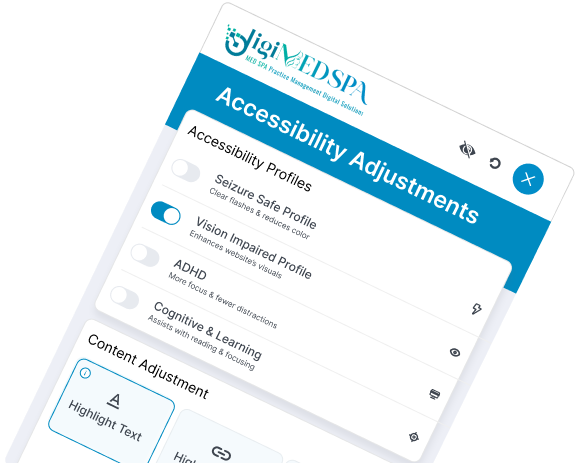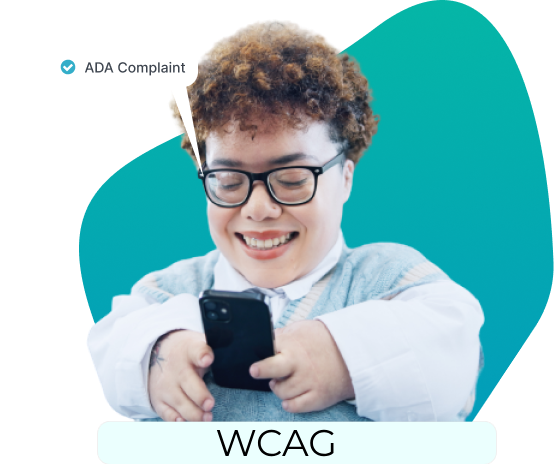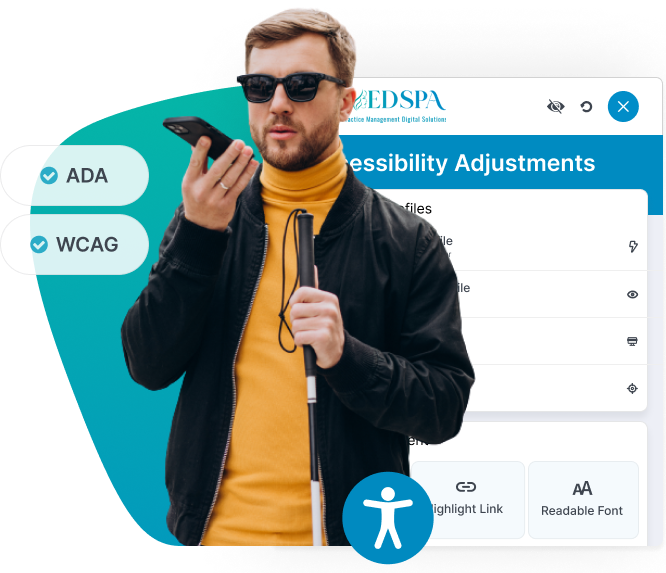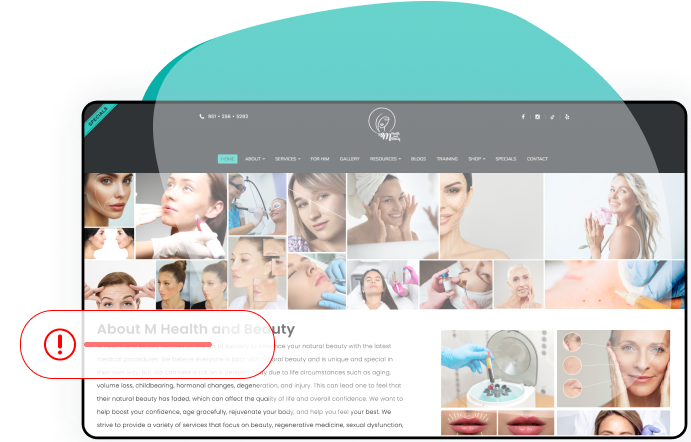Why is Accessibility Important?
Online presence must meet the "Americans With Disabilities Act (ADA)" Compliance. This means your website must be accessible to Americans with a range of disabilities. Your website is the first impression that your potential patients will have of your Med SPA. At DigiMEDSPA, we specialize in creating ADA-compliant, modern, visually stunning websites tailored to each unique brand and message. We will be thrilled to build you the most user-friendly and trendiest website to wow your visitors and turn them into loyal patients.
Because You Care
The Census Bureau reports 47 million Americans with disabilities. As the population ages, this number will increase to 98 million by 2060. 20% of the population are individuals with vision, hearing, cognitive, or physical disabilities who have significant challenges accessing websites, applications, and documents online. Having an ADA-compliant website will show your visitors that you care about this population and will boost your ranking in search engine sites such as Google, Yahoo, and Bing.
Search Engine Optimization
According to recent reports, Search Engine Sites such as Google, Yahoo, and Bing have enhanced their algorithm to look for websites that are easier and faster to visitors and rank them higher on their search engine pages, thereby making your website search engine ranking more competitive against your competitors who spend higher bid amounts than you.
Avoid Potential Lawsuit
- Abusive lawsuits under the ADA have spread across the US, plaguing small and micro businesses.
- The ADA law has opened doors for persons living with disabilities.
- Lawyers view the ADA law as being used to file lawsuits against small businesses.
- A plaintiff's (Disable's) attorney brings a lawsuit; the business pays an average of $16,000 for legal fees in addition to the cost of making his website ADA-compliant.
- This is a forced and extorted settlement because the cost of fighting the allegation will be 4 to 5 times the average ($75,000) in annual income generated by the business. And the trial lawyers know this.
https://www.forbes.com/sites/realspin/2016/12/22/the-ada-lawsuit-contagion-sweeping-u-s-states/#2913abd634ee
What is ADA?
- ADA is "The Americans with Disabilities Act."
- ADA provides people with disabilities "equal opportunity."
- It was signed into law on July 26, 1990, by President George H.W. Bush.
- The ADA prohibits discrimination against people with disabilities and guarantees them the same opportunities as everyone else. These opportunities include employment possibilities, purchasing of goods and services, and the ability to participate in state and local government programs.


Does the Law Apply to My Website?
The law applies to the following four areas;
- The Americans with disabilities and their friends, families, and caregivers.
- Private employers with 15 or more employees.
- All state and local government agencies (which includes both physical and programmatic access to all programs and services offered).
- Businesses operating for the benefit of the public and non-profits (more specifically, "public accommodations and commercial facilities") See interpretation below.
Recent interpretations of the LAW in different lawsuits terms a website as a non-physical public accommodation place. With this interpretation, the LAW now makes it clear that businesses need to provide the same level of accessibility online as disabled people are guaranteed by law offline.
The ADA Lawsuit Contagion Sweeping US States
- Abusive lawsuits under the ADA have spread across the US, plaguing small and micro businesses.
- The ADA law has opened doors for persons living with disabilities.
- Lawyers view the ADA law as being used to file lawsuits against small businesses.
- A plaintiff's (Disable's) attorney brings a lawsuit; the business pays an average of $16,000 for legal fees in addition to the cost of making his website ADA-compliant.
- This is a forced and extorted settlement because the cost of fighting the allegation will be 4 to 5 times the average ($75,000) in annual income generated by the business, and the trial lawyers know this.

How to Make Your Website ADA-Compliant
- Hire a digital agency with extensive knowledge of ADA WCAG 2.0 compliance rules and best practices.
- Verify that the digital agency guarantees its work against potential lawsuits.
- ADA compliance should be done from the start of website development.
- ADA compliance can also be added to the existing website, but it requires a more difficult process to add retroactively.
What are Web Content Accessibility Guidelines (WCAG)?
- WCAG is "Web Content Accessibility Guidelines"
- WCAG
- Published in December 2008
- Became an official international standard for website accessibility in 2012
- WCAG 2.0
- Organized as 12 guidelines under four principles (POUR):
- Perceivable: Web content is made available to the senses – sight, hearing, and/or touch.
- Operable: Interface forms, controls, and navigation are operable.
- Understandable: Content and interface are understandable.
- Robust: The site should work in all environments.
- Organized as 12 guidelines under four principles (POUR):

WCAG Levels of Compliance
WCAG guidelines and principles conform to compliance
(success criteria) in one of three levels:
Makes sites accessible to people with a wider range of disabilities, including the most common barriers.
Most demanding level of WCAG compliance.
In 2018, Revised 508 standards made WCAG 2.0 Level AA the accessibility standard for websites and web content.
Our Five-Step Solution to
Make Your Website ADA-compliant
Ensuring your website is accessible to all users, including those with disabilities, is not only a legal requirement but also a crucial aspect of providing an inclusive online experience. Our comprehensive five-step solution is designed to help you achieve ADA compliance efficiently and effectively.
Implementation
& Implementation
- There are a number of paid and free automated testing tools available online. However, they are less accurate and do not cover everything. That is why you cannot rely on them alone.
- You need to thoroughly test the website manually and verify each guideline individually.
- Detailed usability testing also needs to be done as a blind or deaf person using different readers to make sure that the website is compliant with level AA.
- After all Code Level Implementations, to do final verification, we use The "Voluntary Product Accessibility Template" (VPAT) document, which evaluates how accessible your website is according to the Section 508 Standards. It is a self-disclosing document produced by us that details each aspect of the Section 508 requirements and how your website supports each criterion.
https://accessibility.oit.ncsu.edu/it-accessibility-at-nc-state/developers/accessibility-handbook/overview-understanding-the-nature-of-what-is-required-to-design-accessibly/voluntary-product-accessibility-template-vpat/
ADA Compliance/Web Accessibility Verification Tool
DigiMEDSPA will use the following validation tool to verify your website accessibility:
DigiMEDSPA Free Accessibility Evaluation
NOTE: You may also use other Web Accessibility Tools to verify your website is ADA-compliant.




 Accessible for All
Accessible for All
